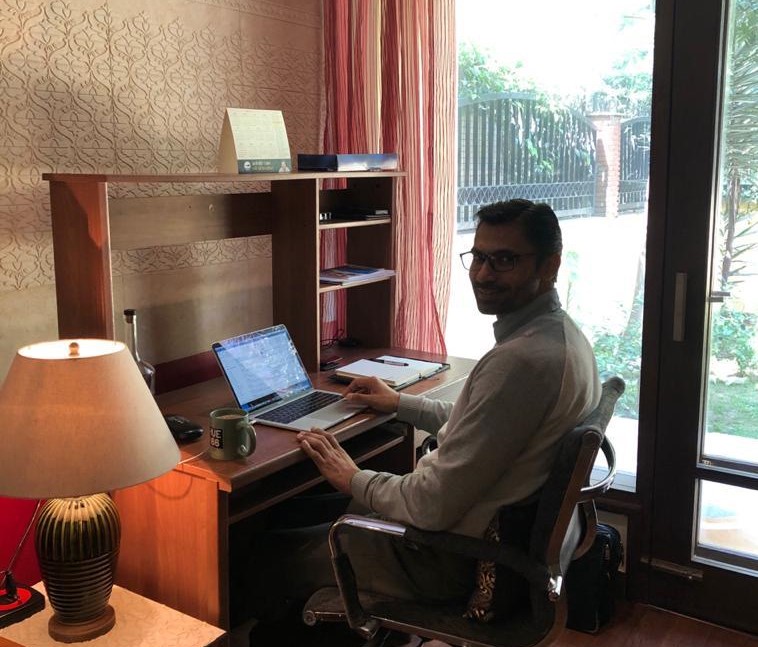Work from home has redefined the way people practise their profession. For many, it’s a welcome change while others hate being confined to their homes
Technology is transforming our lives. The whole process got a big fillip in the last few months because of the pandemic as we continue grappling with the ‘new normal’ in our own quintessential ways.
‘Work from home’ is one such practice that has been made possible by the democratic use of the technology and the necessity to continue functioning despite the pandemic. It has, in the last few months, changed the way people practise their profession. Some welcome this change, others are growing nostalgic of the ways things were and used to function not long ago.
It was a contingency measure that may become a norm, and if the experiences of the last few months are of any consequence, ‘work from home’ may continue to be practised in some sectors long after humanity has tamed the current and present monster—the raging pandemic of Covid-19.
People have converted a room in their dwelling as the designated workspace, some have even purchased new furniture, or have given their home office a facelift to keep the binaries of work and leisure spaces. The need for distinctive workspace from home is not merely psychological, it’s ingrained in the work culture.
“Work from home” was a bit of a personal revolution for many, and people have mixed feelings about it, though all agree it’s a precursor to how people will function in the future. However, there’s no denying the fact that it’s a more flexible, economical and environmentally friendly way of functioning.
Bhupender Singh is the President and CEO of Teleperformance DIBS, a leading business services company with over 3,30,000 staff across 80 countries with a market capitalisation of over $12 billion. He’s been handling the global affairs from the confines of one of the rooms of his house. An athlete in his free time, Bhupender likes to lead a disciplined life.
For him, not much has changed. He gets ready as he used to, at 9 am sharp he’s at his workstation. Only now he gets to have lunch with his family.
He dresses up like he was to visit his office, the only change is that he wears slippers instead of shoes. “That’s not much of a change, either,” he clarifies, “even in my office chamber I’d remove my shoes, just be in socks.” He finds shoes restrictive, that’s when he’s not running—10 kilometres a day five days a week. He points out that the sales of slippers have gone up during the pandemic, and there’s no prize for guessing the reason behind it.
Getting into a routine is important and one of the key traits of successful people, and Bhupender is no exception. Despite ‘work from home’, he follows a strict time table, or else “you’re always at work, or never really working—there’s no work- leisure boundary.” And Bhupender is one of such people who doesn’t mix the two.
Naveen is a young, successful lawyer who’s inundated with work for the good part of the week, and also doesn’t enjoy the merging of work and personal spaces. He lives in Noida and his living room doubles as his office. As he puts it, “Just a couple of steps away from the comfort of the kitchen and the bedroom” and, therefore, it takes “a lot of energy to stay put.”
Naveen misses going to the court. Using public transport between meetings “was also a break” when he’d stop thinking about work and “read a book or listen to music.” These breaks would revitalise him for another round of long discussions or detailed briefings. Also, there used to be chance encounters with fellow lawyers who’d invariably have interesting stories to tell. Now with the online hearings, you do see compatriots, but there’s just enough scope to “acknowledge” each other’s presence across the screen.
“There’s something unhealthy about work from home given the nature of work,” Naveen points out and after a long pause, he adds with perceptible consternation, “Home is your office and you’re available 24×7. I like division. It keeps me grounded. I have not been able to do anything new because I get to spend more time at home.” There’s a genuine fear amongst many: When you work from home, there’s no such thing as a holiday.

Akshay Sahay, 25, another busy lawyer, has had a different experience. He lives with his family, two of whom are also lawyers. Work from home offers him a certain flexibility that allows him to do things that he loves doing but wouldn’t find the time for in the old format of “physical hearings” like going for a run in the evening.
He had long working hours and was away from home for at least 14 hours a day, with some transitory respite from gruelling work schedule on Friday evenings. He was conspicuous by his absence when it came to family life, as he succinctly puts it, “nothing beyond work.”
Further, he points out, “people had difficulties juggling between courts. Now you can attend court proceedings in Chhattisgarh or Lucknow sitting in your study.” Not only does one saves time commuting, but the new online hearing format also requires lawyers to be better prepared, making the whole process smoother. Akshay points out that the judges have learned to read text on a computer screen and filing through the web is a norm, which has ushered an end to the world of hard copies. In short, “It’s all very comfortable.” Attire is the only thing that “hasn’t changed at all.”
One of the interpretations of work from home that is doing rounds on the internet is that “Everything is better in your pajamas.” Others offer the sage advice: “Don’t make the bed your work station. You want your bed to be a place of peace and calm, not work stress.”
(Cover: Bhupender Singh managing a multinational from his home office)





